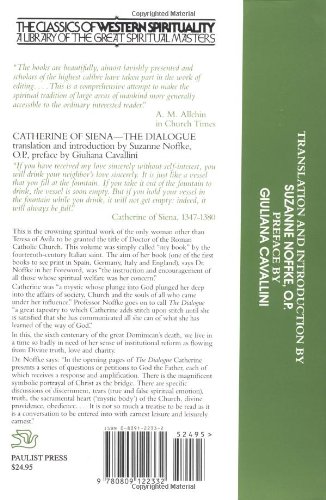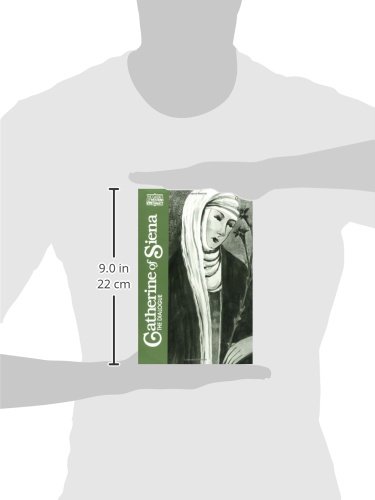



Catherine of Siena : The Dialogue (Classics of Western Spirituality)
J**L
A beautiful woman
Like a beautiful woman, the Dialogue of St. Catherine of Siena is a montage of purity, epiphany, and contradictions.There is considerable preoccupation with sin - much more so than you find in John Climacus's Ladder of Divine Ascent. Indeed, the Dialogue might be crudely characterized as a not-ineffective Wagnerian jeremiad of moral shaming. In this, it resembles the excesses of St. Jerome and might be argued to veer dangerously close to scrupulosity, i.e. raising purity to the level of an obsessive-compulsive vice, the net effect being to dull the joy of the affections with relentless self-questioning. "In other words, the soul in the purity of her conscience sees guilt even where there was no guilt" (p. 136). That is, you will not find the spirit of St. Augustine's "Sin boldly" here. There also is a strong prudish aversion to the physical body and the physical world that borders Gnostic heresy.The Dialogue, then, labors under medieval moral extremism but also ontological dreariness: God's mercy is infinite but He will "torture forever" those who sin against him; God on the one hand has (is) limitless love, but on the other hand his anger toward the workers in His garden could only be mollified by sending his son to the garden so the workers could kill him. By letting them kill His son His anger toward His workers was assuaged. This Kafkaesque explanation, which really explains nothing read literally, is of course mainstream orthodoxy; however other Catholic divines have offered more trenchant and compelling explanations for the vicarious atonement and crucifixion.Catherine dictated the lion's share of this work. So, as with Aristotle's writings, what we have here is a second-hand report - subsequent and unknown editorial alterations are known to have occurred "apparently in an attempt to bring Catherine's theology back into line" (p. 207). This I find fascinating. It might explain tension between mystic affirmations and orthodox affirmations throughout. (After all, part of the fun of mystics is their heterodoxy.) For example, Catherine relates that God has told her that Christ *already has* returned:"He said he would return and he *did* return. For the Holy Spirit did not come alone, but with the power from me the Father and with the wisdom of the Son and with his own mercy. So you see, he returned, not in the flesh but in his power, to firm up the road of his teaching" (p. 70). On the next page following this theological bombshell, however, it is affirmed Christ *will* return in the flesh in line with Mark 13. So, while "Catherine is profoundly orthodox," there are sufficient couplings of such mystical heterodoxy with hard-line orthodoxy to give the reader pause - what did Catherine really think?There can be little doubt what Catherine would have thought of the late Pope John Paul II and his subsequent beatification, when rather than disciplining thousands (at last count) of child-raping Roman Catholic priests he instead oversaw their being posted to new dioceses; (eg, Cardinal Bernard Francis Law, who engaged in a vast cover-up of sexual abuse of minors by Roman Catholic priests while Archbishop of Boston, far from being disciplined by John Paul II retained his post as a member of the Pontifical Council for the Family):"No rank, whether of civil or divine law, can be held in grace without holy justice. For those who are not corrected and those who do not correct are like members beginning to rot... So it is with prelates or with anyone else in authority.... But [those who are in authority] today do not do this. In fact, they pretend not to see. And do you know why? Because the root of selfish love is alive in them... They do not correct people for fear of losing their rank and position.... Another reason they will not correct others is that they themselves are living in the same or greater sins (p. 224).... And sometimes when they recognize that these religious are incarnate devils, they send them from one monastery to the next to those who are incarnate devils like themselves (p. 241).... But if my Son's vicar becomes aware of their sin he ought to punish them. He should relieve those of office who will not repent and change their evil way of living... If Christ on earth [ie, the Pope] does this, he is doing his duty. If he does not, his sin will not go unpunished when it is his turn to give me an account of his little sheep" (p. 249).If you believe this work was truly revealed to Catherine by God, then you too can have little doubt how God would view the post-Vatican II antipopes. See, for example, The Destruction of the Christian Tradition, Updated and Revised .This book reminds me of the truism that relatively uneducated people knowing only their native tongue can achieve remarkable purity of expression by the ironic strength of that very limitation. There is undeniably a salutary effect from reading this book, a resplendent Zen-like spirit of purity hovering over its pages. It's a marvelous (though at times surely tedious) work. St. Catherine was obviously an impressive woman, a beautiful woman, and I'm happy to have read her Dialogue. I will no doubt often return to it.Each page of this book is packed with profound wisdom. Highly recommended.
J**Y
Worldclass Classic
This is a very thoughtful and careful translation of the primary teaching of one of the world's greatest mystic saints. It purports to be a dialogue with God the Father, obtained by the mystic ecstacy of St. Catherine, although probably not in the sort of very short and very dramatic fashion that a movie maker might cast it. These insights did come to her through her inner life. The wordings she received were important to her, and at the key sections, she herself felt that the wording could not be changed without doing irreparable and unnecessary harm. Still, she herself spent a lot of time editing these for clarity, in passages that were available to her to edit.Of course, we have the writings of many great mystic saints, and none of them should be neglected. St. Theresa of Avila wrote voluminously. St. John of the Cross wrote extensively. St. Theresa of Lisieux deserves top mention. None of these is somehow less or worthless. Still, it is entirely necessary to be in a right frame of mind to ascertain what the great athletic saints like Theresa of Avila or John of the Cross are really saying. They wrote from a frame of mind that is hard for ordinary people to match. Theresa of Lisieux is more accessible much of the time, and she cannot be neglected.Still, the Dialogues of St. Catherine are wonderful because they are more accessible to ordinary people. They don't have the repulsive saccharin veneer (which turns out to be necessary and endearing when properly assimilated) of Theresa of Lisieux. They don't have the athletic difficulty of Theresa of Avila or John of the Cross. They are accessible. We can read them. We can see what they mean. We can, in fact, move our lives in practical ways toward the direction and state of mind that St. Catherine indicates. It is a very comforting book in that way.In the end, what do we want? What does everybody want? We all want to make our lives into something that matters, and not just have our lives amount to nothing at the end. Most of us have few strategies to make their own lives the beautiful work of art it can be. We have so many people who say that this or that is "larger than life." Such people are foolish. They make their lives too small. St. Catherine offers a wonderful doorway. We can all walk through and make our lives much better, much richer, much more pleasing---not just to God---more pleasing to ourselves, too. Is there someone in the world who doesn't want his/her life to be wholesomely beautiful, to be an experience of growth and freedom---to be liberating? Is there, anywhere in the world, a person who would not like his/her life to touch the celestial realm---to realize the image of God in which we are created? I think there is not one person.
S**N
Top 5 All-Time Greatest Catholic Classic!
This is easily one of the top 5 catholic classics. I think that this is the only time in the history of Christianity that God has given a whole book to an individual, speaking in the first person. For this alone, it is absolutely astounding. It is like God delivering a Bible study class. It is not light reading by any means, and without sounding patronising, if you've never read anything spiritual and you only have money for one book, this is risky. If you have money for 5, then buy it and let it sit on the shelf till you're ready and aged 37 (like me), you will never regret it. See you in Heaven, God willing!
K**R
Classic Book.
This is a Classic Book. So deep. Love her writings and life lived so beautifully.
M**S
Five Stars
Interesting and enjoyable read.
Trustpilot
1 day ago
2 weeks ago